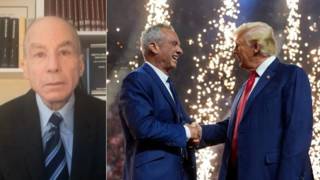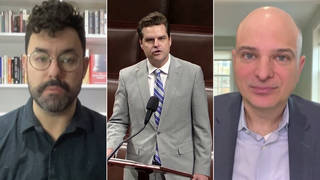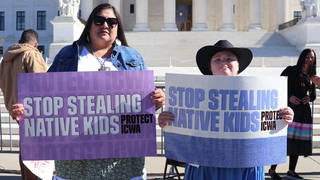
Related
Guests
- Sarah Deercitizen of the Muscogee (Creek) Nation of Oklahoma and a professor at the University of Kansas.
In a landmark decision, the Supreme Court has ruled that much of eastern Oklahoma, constituting nearly half the state, is Native American land, recognizing a 19th century U.S. treaty with the Muscogee (Creek) Nation. Justice Neil Gorsuch, a Trump nominee, joined the court’s liberal wing in a narrow 5-4 ruling that found state authorities cannot criminally prosecute Indigenous peoples under state or local laws. The court’s bombshell decision — which also impacts the Cherokee, Chickasaw, Choctaw and Seminole Nations — is a major victory for Indigenous sovereignty and treaty rights. “It’s a landmark case, and probably the most important Indian law case in the last half a century to come down from the court,” says lawyer Sarah Deer, a citizen of the Muscogee (Creek) Nation of Oklahoma and a professor at the University of Kansas. “The language of the decision itself goes far beyond Oklahoma.”
Transcript
AMY GOODMAN: This is Democracy Now! The Quaranatine Report. I’m Amy Goodman.
In a major victory for Indigenous sovereignty, the Supreme Court ruled Thursday that about half of Oklahoma remains Native American land, recognizing a 19th century U.S. treaty with the Muscogee (Creek) Nation in a narrow 5-to-4 ruling.
Justice Neil Gorsuch, who joined the court’s liberal wing, wrote the majority opinion. It began, quote, “On the far end of the Trail of Tears was a promise. Forced to leave their ancestral lands in Georgia and Alabama, the Creek Nation received assurances that their new lands in the West would be secure forever. … Because Congress has not said otherwise, we hold the government to its word,” he wrote.
The landmark decision is based on the case of Jimcy McGirt, a Native man who the state of Oklahoma convicted in 1997 for sex crimes against a 4-year-old child on Muscogee (Creek) land. McGirt argued that because the crime took place on the tribe’s territory, the state had no jurisdiction to try his case — a claim the Supreme Court affirmed in its decision.
Cherokee writer and advocate Rebecca Nagle tweeted, quote, “The big news at the Supreme Court today will be Trumps taxes. But for Indians in Oklahoma, we’ll be talking about today for decades. After a century of #Oklahoma not following our treaty rights, the Supreme Court said no more. Eastern Oklahoma is Indian Country,” she wrote.
Well, for more on this historic ruling, we go to Lawrence, Kansas, where we’re joined by Sarah Deer, citizen of the Muscogee (Creek) Nation, lawyer, professor at the University of Kansas, author of The Beginning and End of Rape: Confronting Sexual Violence in Native America.
Welcome to Democracy Now!, Sarah Deer. Can you talk about the significance of the Supreme Court ruling, penned by none other than President Trump’s appointee, Neil Gorsuch?
SARAH DEER: Well, thank you for having me, first of all.
You know, it’s really interesting that the politics on the court don’t necessarily, when it comes to Indian Country, fall into a liberal-conservative division. Indian law is kind of unique in that way. In fact, Justice Ginsburg, who, of course, is a woman attorney I have utmost respect for, has not always sided with tribal interests.
But Gorsuch was an interesting selection, because although his social justice issues on other matters are problematic, he actually has a pretty good track record in the 10th Circuit of recognizing and acknowledging tribal rights. And so, when he was nominated, in fact, the National Congress of American Indians supported his nomination, because they saw in his writings in the lower courts that he really did understand tribal sovereignty and was willing to look at the history in order to resolve disputes.
AMY GOODMAN: So, again, this ruling says that half of Oklahoma is Native American land. What does this mean?
SARAH DEER: Well, I have to say that’s not entirely accurate. It doesn’t mean that the land is all under tribal control now. What this does is it reasserts the boundaries of the reservation so we know to the extent to which the tribe would have certain kinds of criminal authority. But, in fact, for most people who have private land, who own private businesses within the confines of the reservation, will not be affected by this decision. It primarily affects the ability of the tribal government to assert itself in partnership with the federal government, but it doesn’t change the status of, say, privately owned land.
AMY GOODMAN: So, let’s talk about what Ruth Bader Ginsburg and others raised, the issue of the thousands of convictions that have taken place there, put people in jail. What does this mean now?
SARAH DEER: Well, I think there’s a lot of overstatements of this potential problem of releasing, you know, thousands of criminals into the streets. There’s been no indication that there’s a trend going in that direction. Even though there have been two victories in the 10th Circuit on behalf of Native people, we don’t see a flood of Native people using these cases to try to get released.
And in fact, what will happen in most of the serious cases, so the cases involving things like murder and rape and child sexual abuse, is those will not be — those convictions may be overturned in the sense that Oklahoma was the wrong government to be prosecuting them, but there’s no doubt that the federal government will take some of those folks into custody and ensure that the community is safe.
AMY GOODMAN: And, of course, Jimcy McGirt, the man who brought this case, who won, it doesn’t mean he goes free. It means he has to be tried in a federal court now rather than a state court. Is that right?
SARAH DEER: Exactly. And, in fact, he could be tried in tribal court, as well, because the tribe also shares that jurisdiction. The tribe, though, has very limited power to, say, impose incarceration or fines. And so, oftentimes with these very, very serious crimes, the federal government is the only one that can provide the kind of safety the community might be looking for.
AMY GOODMAN: The ruling was based on the Muscogee (Creek) Nation’s historic claims but could also affect four other tribes: the Cherokee, the Chickasaw, the Choctaw and Seminole tribes. I think Jimcy McGirt is Seminole. Can you talk about the wider implications of this?
SARAH DEER: Sure. Well, it’s a landmark case and probably the most important Indian law case in the last half a century to come down from the court. It’s that powerful. Certainly, the other four tribes that were on the Trail of Tears — the Cherokees, as you mentioned, and the like — they have very similar treaties that the Creek Nation has. And so, while there might be some nuance and difference in terms of exactly how the treaty plays out for these other tribes, essentially, the question about what these treaties mean has been answered by the court, and so it would be unlikely that the state would be able to litigate successfully against those tribes to try to sort of retain their control over those reservation boundaries.
And beyond that, just the language of the decision itself goes far beyond Oklahoma, because they’re reiterating — what Gorsuch is doing is reiterating some foundational principles of tribal sovereignty. And so his analysis will have implications for all kinds of Indian law cases yet to come.
AMY GOODMAN: So, you have Neil Gorsuch referencing the Trail of Tears. Describe for us that history. What happened? What forced so many Native Americans into Oklahoma?
SARAH DEER: Well, there were just many, many wealthy people who wanted access to the land, the plantation land that was so valuable to white landowners in that time period. See, we were in what is now Alabama and Georgia, where the plantation economies were at their strongest. And Indians were in the way. And Indians didn’t want to move.
And so, despite the fact that the court in that time period said that the president didn’t have the right to remove the tribes, Andrew Jackson did just that and defied the Supreme Court, marched all five tribes at bayonet point to what is now Oklahoma, against our will. And when we got there, we were promised that we would have the land there forever.
AMY GOODMAN: And talk about how President Andrew Jackson fits into this story, President Trump saying it was his favorite president, and now, for example, the Jackson City Council in Mississippi voting to take down the statute to Andrew Jackson.
SARAH DEER: Yes. Andrew Jackson was a brutal man. And he, particularly around my tribe, my tribal’s history, the Creek Nation, engaged in warfare, dehumanized us, called us names, had no interest in compassion to be exerted towards our people, and really just marched us to a death march, west to Oklahoma, and many, many tribal members died along the way because the circumstances were so dire. So we associate — the five tribes in Oklahoma that we’ve been talking about do not have any affinity or affection for Andrew Jackson. He has been the cause of much of our troubles over the last two centuries.
AMY GOODMAN: Sarah Deer, you’re a citizen of the Muscogee (Creek) Nation. You’re author of the book The Beginning and End of Rape: Confronting Sexual Violence in Native America. This case that the Supreme Court historic decision is based on, Jimcy McGirt was involved in sexually attacking a 4-year-old child. You have looked at violence against women and girls for years. Put it in that context for us.
SARAH DEER: Sure. Well, it certainly seems odd for me to advocate on behalf of a sex offender, given my work. But in this case, I see a larger issue about safety for Native women and girls and two-spirit people who are victims of violence, because what this is doing is, while, yes, this McGirt case conviction is overturned, what I would like to see happen, going forward, now that we have this case, is that actually the tribe can pick up some of these cases, because now our territorial reach is larger, and so we can engage in crime control in a larger area of the reservation.
And I believe that tribal sovereignty is going to be key to protecting people from violence, because the state doesn’t have a vested interest in necessarily the safety of the reservation. The federal government is far away, you know, taking down Enron and large-scale drug trafficking rings. And I would like to see the tribal nations, who do have criminal jurisdiction — now that’s expanded territorially — to really pick up these cases and try to resolve them in a way that’s going to make the community safe but not necessarily replicate the law-and-order model of the state and federal governments.
AMY GOODMAN: Sarah Deer, can you talk about how the media has covered this historic Supreme Court decision on the last day of the Supreme Court’s term, coming down the same day, of course, as the ruling on President Trump’s tax returns?
SARAH DEER: Sure. Well, I can say the wait has been grueling. We’ve been waiting for this decision for well over a year and a half. I think that the headlines that I’m seeing, even in more sympathetic media, are sort of overstating the case and, I think, creating a lot of fear and anxiety for people in Oklahoma. It doesn’t give land back, per se. And there’s nothing that the tribe will be able to do to move people off their privately owned land or run their privately owned businesses. Very little is going to change on the ground for non-Indians. And so, when I see headlines like, you know, “The Tribe Has Been Given Back Land,” it overstates it quite a bit. While it’s still an important case, it’s not giving the tribe power over most people that live on the reservation who are non-Native.
AMY GOODMAN: And so, putting this in the context of all the protests in this country right now around racial injustice, around the whole Black Lives Matter movement, around people of color being so violated over the years, yet not recognized, changing the narrative, can you talk about how you see this decision changing the narrative and fitting into this uprising around the country?
SARAH DEER: Sure. Well, I think that the way Gorsuch — Gorsuch is a beautiful writer. And there’s no doubt in my mind that he used logic and legal reasoning to reach his decision. But his writing conveys something a little bit more, that we typically don’t see from the court, and that is a sense of empathy and compassion. And again, I’m not suggesting that was the basis of his decision, but to offer that in the rhetoric of his prose gives me great, great hope.
And I do think that this is coming at a very interesting time. While this case actually precedes the rising up of the contemporary Black Lives Matter movement, I think it’s part of that same — the same effort to raise awareness about oppression. And I think that Native people owe a debt of gratitude to the leadership of Black Lives Matter, because in raising those issues of race and injustice, we’ve also been able to elevate the issues of Native racism and injustice. And people who are sympathetic to the Black Lives Matter movement are more amenable to the sympathies for Native people. So I think it’s not a coincidence that this case comes out at that kind of time.
AMY GOODMAN: We have to leave it there. Sarah Deer, citizen of the Muscogee (Creek) Nation, we thank you so much. I’m Amy Goodman. Stay safe.












Media Options